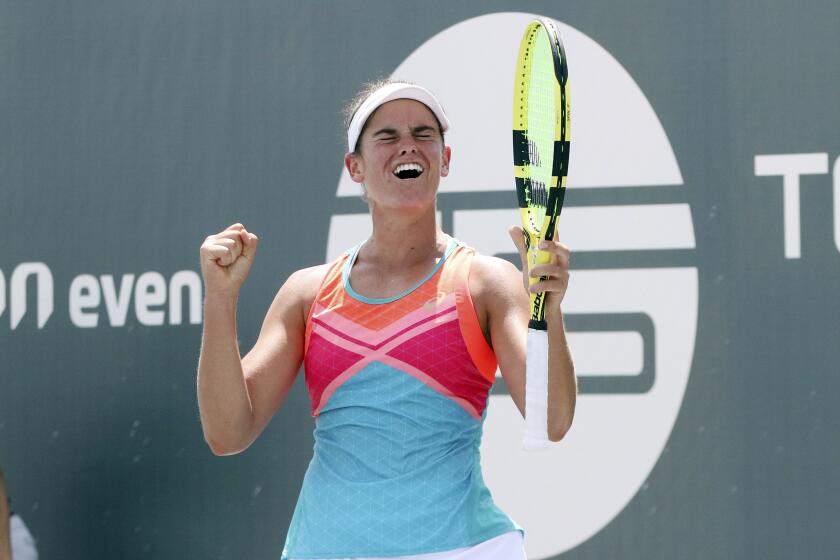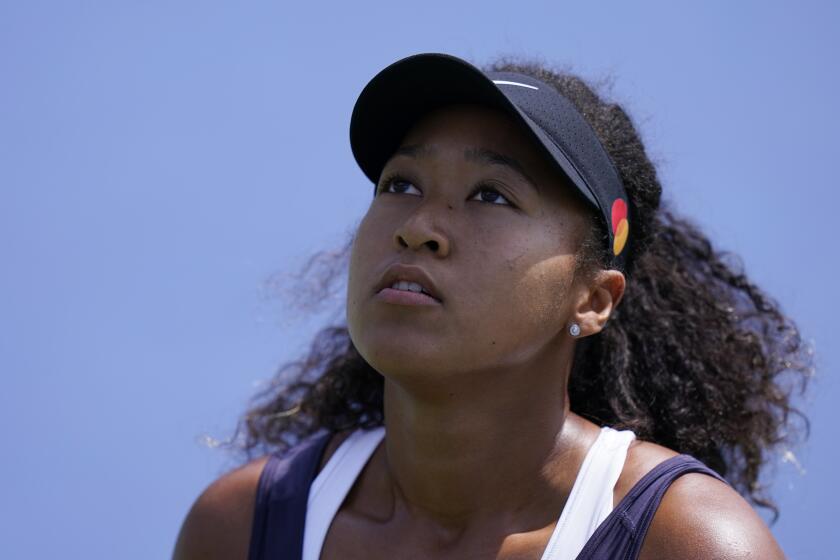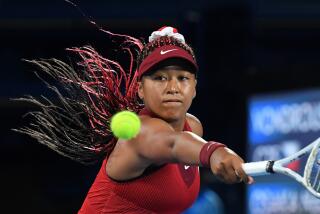Column: Pam Shriver couldn’t make it to the U.S. Open this year, so ESPN brought it to her
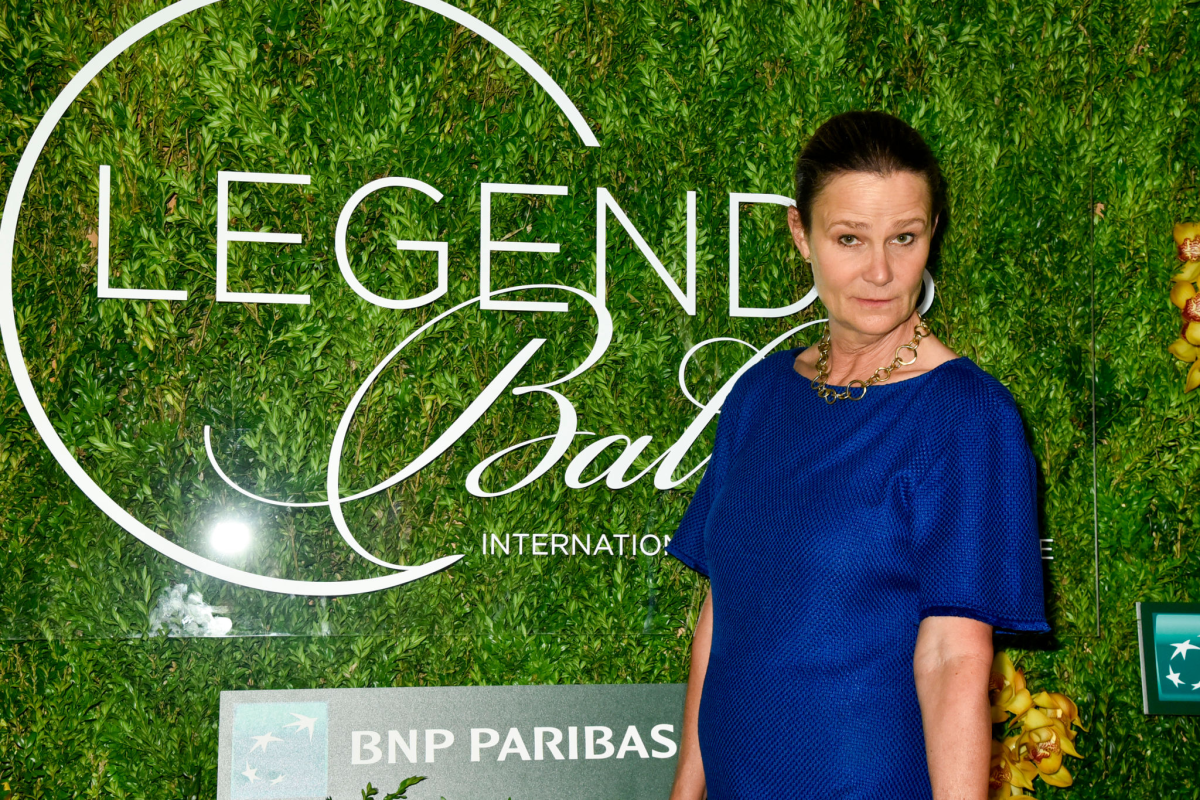
Pam Shriver traded in her prime courtside commentary position at the U.S. Open tennis tournament for a cubbyhole in what used to be a wet bar in her Brentwood home.
The shelves in the background of her ESPN reports hold an eclectic mix of books about the Baltimore Orioles — she’s a member of the team’s limited partnership group — Pushkin poetry and plays, rare editions of works by Mark Twain and Victor Hugo, books on parenting, books by the late sportswriter Frank DeFord, and the Baltimore-centered novels of author Anne Tyler. Shriver also set up an assortment of memorabilia from her five U.S. Open doubles titles and her singles runner-up finish in 1978.
Of course, she put tennis books on display. Lots of them, besides “Passing Shots,” the book she co-wrote, which was published in 1987. The mix includes books by or about Harry Hopman, Chris Evert, Monica Seles, Dick Enberg and James Blake. Among her favorites are two copies of Bud Collins’ tennis encyclopedia and a copy of “Pressure Is a Privilege” by Billie Jean King.
“Everybody covering a major from home, you have to have ‘Pressure Is a Privilege,’” Shriver joked during a FaceTime tour of her lair.
Top-seeded Novak Djokovic has been defaulted from his fourth-round match at the U.S. Open after he accidentally hit a line judge with a tennis ball.
Concern for her family’s well-being led Shriver to decide she wouldn’t travel to New York this year. ESPN, which benefits from her copious knowledge when she interviews celebrities and analyzes tennis matches around the world, shipped TV lights, a camera and some cords to equip her new workplace. She had to rely on a local electronics store for a monitor so she could more easily tap into match statistics while chatting with fellow broadcasters on-site in New York. She also uses her kids’ long-corded gaming mouse for troubleshooting with the camera.
“My office is just off my master bedroom,” Shriver said. “One of my theories is I needed to double-door it with three kids at home.”
Those kids are the primary reason she stayed in California. Her oldest son, 16-year-old George, has Type 1 diabetes. He and 15-year-old twins Sam and Kaitlin are learning remotely from three different high schools — George at Palisades High, Sam at Viewpoint in Calabasas and Kaitlin at Harvard-Westlake. The children’s father, 81-year-old actor George Lazenby, comes to see them often. Three family members have underlying medical conditions, Shriver said, and she felt compelled to be with them during these strange times.
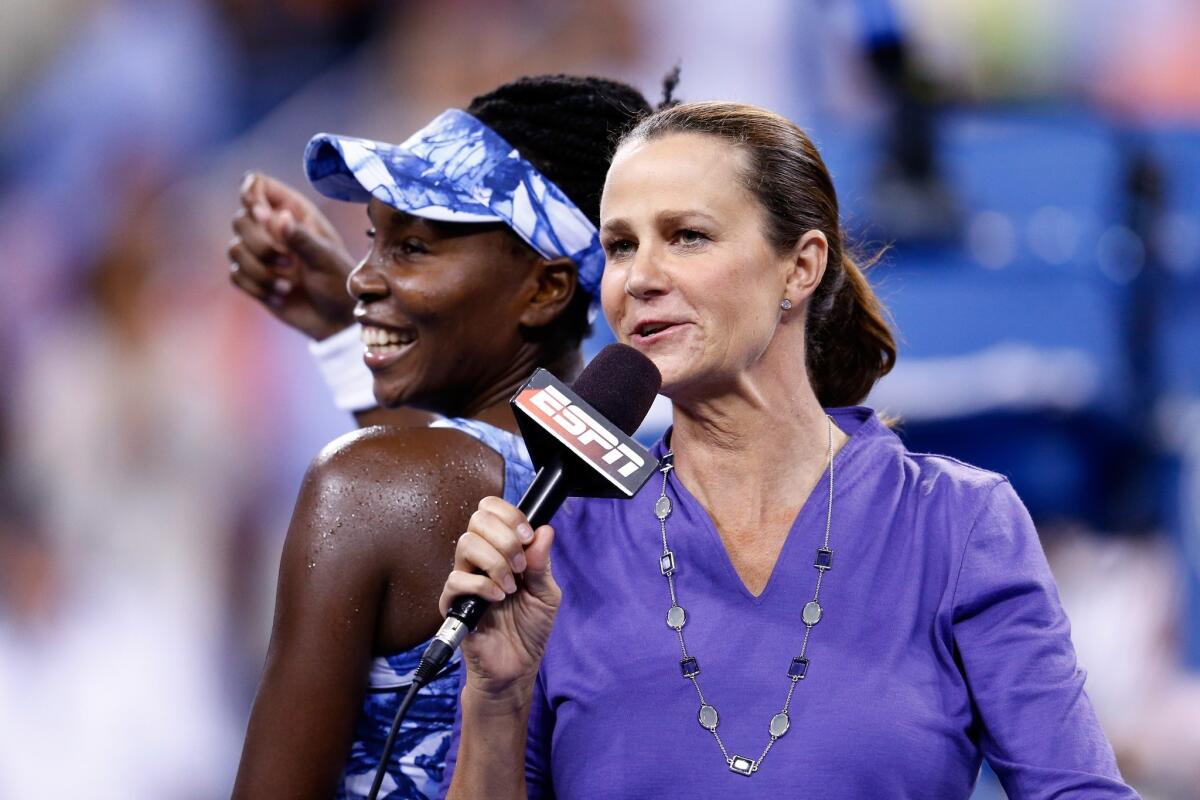
“The decision really wasn’t a decision in my case, given I’m a single mom of these three kids,” she said. “Obviously, we all want to be there. Tennis history is being written. I wanted to be there but I knew I just couldn’t.”
The length and risk of the cross-country flight was a big concern. “I felt like being on the inside and hearing all the U.S. Tennis Assn. was going to do to keep the bubble as safe as possible, if I could just sort of beam up and get there without the travel it may have been a different situation,” said Shriver, who won 22 Grand Slam doubles titles, 20 of them in women’s doubles with Martina Navratilova. “In the end, it was a pretty easy decision, but you miss being there.”
Former UCLA tennis player Jennifer Brady left the country to take her game to another level. Now she’s seeded at the U.S. Open for the first time.
She misses the camaraderie, the up-close view of matches at Arthur Ashe Stadium, and experiencing her life and tennis career curling back on themselves. Her son George is the same age she was when she reached her lone Grand Slam singles final, the 1978 U.S. Open. “It’s kind of an interesting look back at how old I was, when I think about my son,” she said.
Shriver lost that final to Chris Evert, who became her friend and broadcast partner. The last flight Shriver took before the pandemic put life on hold was in February, when she attended the funeral of Evert’s sister, Jeanne Evert Dubin.
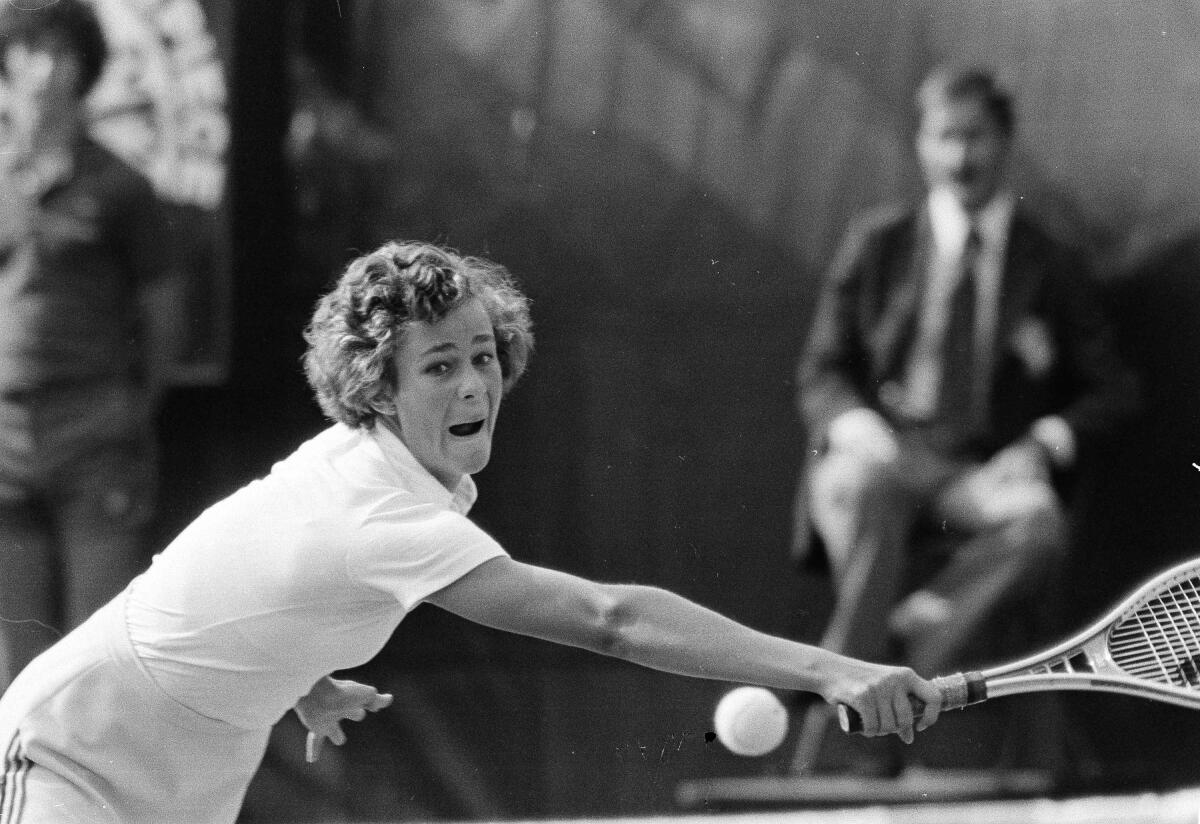
Working at home has presented some technical challenges. Shriver was calling a first-round match between Kim Clijsters and Ekaterina Alexdrovna when she was knocked off the air, prompting her to text her broadcast partners that she shouldn’t be brought into the conversation. “Fortunately it was in the last game, two or three points from the end of the match,” she said. And because of the brief transmission delay, she found herself talking at the same time as host Chris McKendry during a live appearance last week, something that might have been avoided if they were in the same place.
Shriver hasn’t been called upon every day, but she has been pitching ideas. Atop her list is an interview with NBA Commissioner Adam Silver, who has spoken to her on-site in previous years. She wants to discuss the social activism of basketball and tennis players, especially in context of Naomi Osaka’s intention to skip the semifinal of the Western & Southern Open tournament to protest what Osaka called “the continued genocide of Black people.” For each U.S. Open match, Osaka has worn a mask bearing the name of a Black person she feels was unjustly killed. In addition, seats at Arthur Ashe Stadium have been decorated with an art installation themed to Black Lives Matter.
Naomi Osaka’s courage following the Jacob Blake shooting, likely lost on most while wildcat player strikes spread across team sports, shouldn’t be overlooked.
“I feel like the NBA, WNBA, tennis and basketball have really been at the forefront of social justice and pushing for change from the athlete platform,” Shriver said. “I admire the way Adam Silver has allowed his athletes to have a big voice and from the bubble.”
Though Shriver isn’t at the Open she has a tennis court at her home. She knows she’s lucky to have that as a refuge. “I was given advice early in the quarantine: Don’t focus on what you don’t have. Focus on what you do have and will have again, and I’ve said that to myself over and over again,” she said. “I think keeping some normal activities during this time is crucial. Playing sports is great, and so is being able to watch sports.”
More to Read
Go beyond the scoreboard
Get the latest on L.A.'s teams in the daily Sports Report newsletter.
You may occasionally receive promotional content from the Los Angeles Times.

